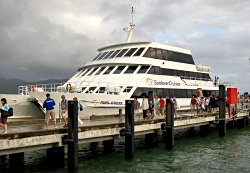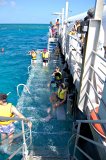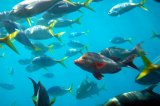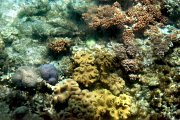|
|
 A
special highlight of our stay at Cairns was a cruise
to the Great Barrier Reef. We chose “Sunlover Reef Cruises”,
which takes you in a fast catamaran to a pontoon
for a 4 – 5 hour stay at the A
special highlight of our stay at Cairns was a cruise
to the Great Barrier Reef. We chose “Sunlover Reef Cruises”,
which takes you in a fast catamaran to a pontoon
for a 4 – 5 hour stay at the  outer
reef, from where all kinds of activities can be chosen. There was a semi
submersible vessel, a glass bottom boat, an underwater observatory, snorkel
equipment, an option for diving, including scuba diving, and helicopter
flights. Also a great buffet lunch was provided. Snorkelling and viewing
the famous corals and fish was a fantastic experience, but as beginners
we didn't get to see any exotic inhabitants of the reef and not the rich
colours as known from films. The pictures of the corals were taken from
the glass bottom boat and those of the fish from the underwater observatory outer
reef, from where all kinds of activities can be chosen. There was a semi
submersible vessel, a glass bottom boat, an underwater observatory, snorkel
equipment, an option for diving, including scuba diving, and helicopter
flights. Also a great buffet lunch was provided. Snorkelling and viewing
the famous corals and fish was a fantastic experience, but as beginners
we didn't get to see any exotic inhabitants of the reef and not the rich
colours as known from films. The pictures of the corals were taken from
the glass bottom boat and those of the fish from the underwater observatory
The
Great Barrier Reef is the world's largest
coral reef. It stretches for 2,600 kilometres (1,616 mi) in the Coral Sea
along the Northeast coast of Queensland, covering an area of approximately
300,000 square kilometres. 'It contains the world's largest collection
of coral reefs,  with
400 types of coral, 1,500 species of fish and 4,000 types of mollusc'*.
The diversity of species is equalled only by that of the rainforests. However,
human activities in the Reef, as in the rainforests, have caused
a drastic decline in this wonder of nature. For this reason in 1975 the
Great Barrier Reef Marine Park was brought into being by the
Australian government for the purpose of preserving the area's outstanding
biodiversity whilst allowing for reasonable use. 1981 the Great Barrier
Reef was inscribed on the World Heritage List. with
400 types of coral, 1,500 species of fish and 4,000 types of mollusc'*.
The diversity of species is equalled only by that of the rainforests. However,
human activities in the Reef, as in the rainforests, have caused
a drastic decline in this wonder of nature. For this reason in 1975 the
Great Barrier Reef Marine Park was brought into being by the
Australian government for the purpose of preserving the area's outstanding
biodiversity whilst allowing for reasonable use. 1981 the Great Barrier
Reef was inscribed on the World Heritage List.
 Reef
building Corals thrive in clear, shallow, coastal, waters of tropical
seas. The various reefs and cays are the basis for the great variety of
sea and animal life in the Coral Reef. Coral animals basically consist
of polyps, which secrete a hard, circular corallite (made of calcium carbonate).
This circular corallite forms numerous radiating walls, which become the
hard shell we recognize as coral. The coral animal continues living and
producing its secretions in the uppermost part of the corallite. Reef building
corals live in symbiosis with a single-celled micro algae (zooxanthellae),
which provides them with food by photosynthesis, while the coral polyp
provides the algae with nutrients in the form of their excrements. Thus
these corals grow much faster than non-symbiotic corals. The colour of
coral results from the photosynthesis of the algae. Generally, healthy
coral has deep colour and becomes light when unhealthy. Coral colonies
create most imaginative structures... Reef
building Corals thrive in clear, shallow, coastal, waters of tropical
seas. The various reefs and cays are the basis for the great variety of
sea and animal life in the Coral Reef. Coral animals basically consist
of polyps, which secrete a hard, circular corallite (made of calcium carbonate).
This circular corallite forms numerous radiating walls, which become the
hard shell we recognize as coral. The coral animal continues living and
producing its secretions in the uppermost part of the corallite. Reef building
corals live in symbiosis with a single-celled micro algae (zooxanthellae),
which provides them with food by photosynthesis, while the coral polyp
provides the algae with nutrients in the form of their excrements. Thus
these corals grow much faster than non-symbiotic corals. The colour of
coral results from the photosynthesis of the algae. Generally, healthy
coral has deep colour and becomes light when unhealthy. Coral colonies
create most imaginative structures...
|